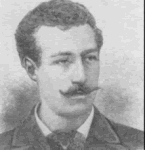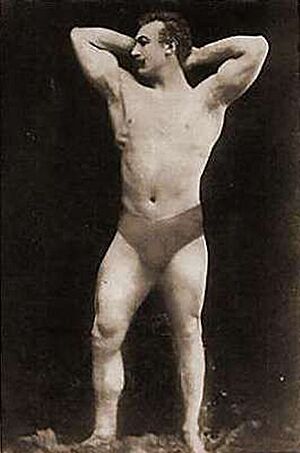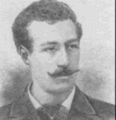Launceston Elliot facts for kids
 |
||||||||||||||||||||||||||||||||
| Personal information | ||||||||||||||||||||||||||||||||
|---|---|---|---|---|---|---|---|---|---|---|---|---|---|---|---|---|---|---|---|---|---|---|---|---|---|---|---|---|---|---|---|---|
| Nationality | British | |||||||||||||||||||||||||||||||
| Born | 9 June 1874 Hubli, Karnataka, British India |
|||||||||||||||||||||||||||||||
| Died | 8 August 1930 (aged 56) Melbourne, Australia |
|||||||||||||||||||||||||||||||
| Resting place | Fawkner Cemetery, Melbourne, Australia | |||||||||||||||||||||||||||||||
| Sport | ||||||||||||||||||||||||||||||||
| Country | ||||||||||||||||||||||||||||||||
| Sport | Weightlifting | |||||||||||||||||||||||||||||||
|
Medal record
|
||||||||||||||||||||||||||||||||
Launceston Elliot (born June 9, 1874 – died August 8, 1930) was a British weightlifter. He was the very first athlete from the United Kingdom to win an Olympic championship!
Contents
Launceston Elliot's Early Life
Launceston Elliot was born on June 9, 1874. He was named after Launceston, a place in Australia, where his parents were living. Before he was born, his family moved to India. He was born in Kaladagi and baptized in Guledgudd, which are now in Karnataka State, India.
His family was part of the Scottish nobility, meaning they had important historical connections. For example, Lord Minto was the head of their family. They also had strong ties to India. The 4th Earl Minto, a relative, was even the Viceroy of India (a top official) from 1905 to 1910. Launceston Elliot's grandfather, Sir Charles Elliot, was once the governor of Saint Helena. His father, Gilbert Wray Elliot, worked as a judge in the Indian Civil Service.
In 1887, when Launceston was 13, his father left his job in India. The family then moved to England, where they started farming in Essex. Launceston was a very strong and well-built teenager. He was seeing England for the first time.
He quickly became inspired by the famous strongman Eugen Sandow. Launceston soon became a very talented weightlifter himself. In January 1891, at just 16 years old, he did well at what is now known as the first British Championships. This event was held at the fancy Café Monico in Piccadilly, London. Three years later, he won the championships at the Royal Aquarium in Westminster.
Competing in the First Modern Olympics
Launceston Elliot was 21 years old and very successful. This encouraged him to travel to Athens, Greece, for the first modern Olympic Games in 1896. Back then, there were no standard rules for weightlifting. The 1896 Olympics had many different types of lifting events.
Two-Handed Lift Event
The two-handed lift was the first event. It was a long competition. Viggo Jensen from Denmark and Elliot both lifted 111.5 kilograms (about 246 pounds). However, Prince George decided that Jensen should get first place. He said Jensen lifted with better style. Jensen's lift was smooth, while Elliot had some difficulty.
One-Handed Lift Event
The one-handed event was much quicker. Prince George kindly offered Elliot a rest, but Elliot said no. He did ask if he could lift after Jensen this time. In the two-handed event, Jensen had lifted after Elliot, which gave him an advantage. Prince George agreed to the request.
Elliot easily lifted 71.0 kilograms (about 156 pounds). Jensen, who had hurt his shoulder trying to lift more in the two-handed event, could only lift 57.0 kilograms (about 125 pounds). And just like that, Britain had its first Olympic champion!
Other Olympic Sports
Elliot also tried other sports at the 1896 Olympics:
- He competed in the 100 meters race in track and field. He finished third in his heat and did not make it to the final race.
- In wrestling, Elliot lost in the first round to Carl Schuhmann of Germany. Schuhmann was also a gymnastics champion.
- He finished last among five competitors in the rope climbing event in gymnastics.
Life After the Olympics
After his victory in Athens, Launceston Elliot continued to be very successful. He set four new records at the 1899 Amateur Championships. He became a well-known figure in British weightlifting, which helped him earn a good living.
He also competed at the 1900 Summer Olympics. This time, there were no weightlifting events. He threw the discus and finished eleventh in that competition. In 1903, he became a professional athlete.
After he retired from sports, Elliot farmed in England for a few years. In 1923, he moved to Melbourne, Australia. He passed away on August 8, 1930, at the age of 56, from cancer of the spine. He is buried in Melbourne's Fawkner Cemetery.
Photographs of Launceston Elliot are displayed among other famous Scottish athletes. You can see them in the sport section of the Scottish National Portrait Gallery in Edinburgh, Scotland.
Images for kids



